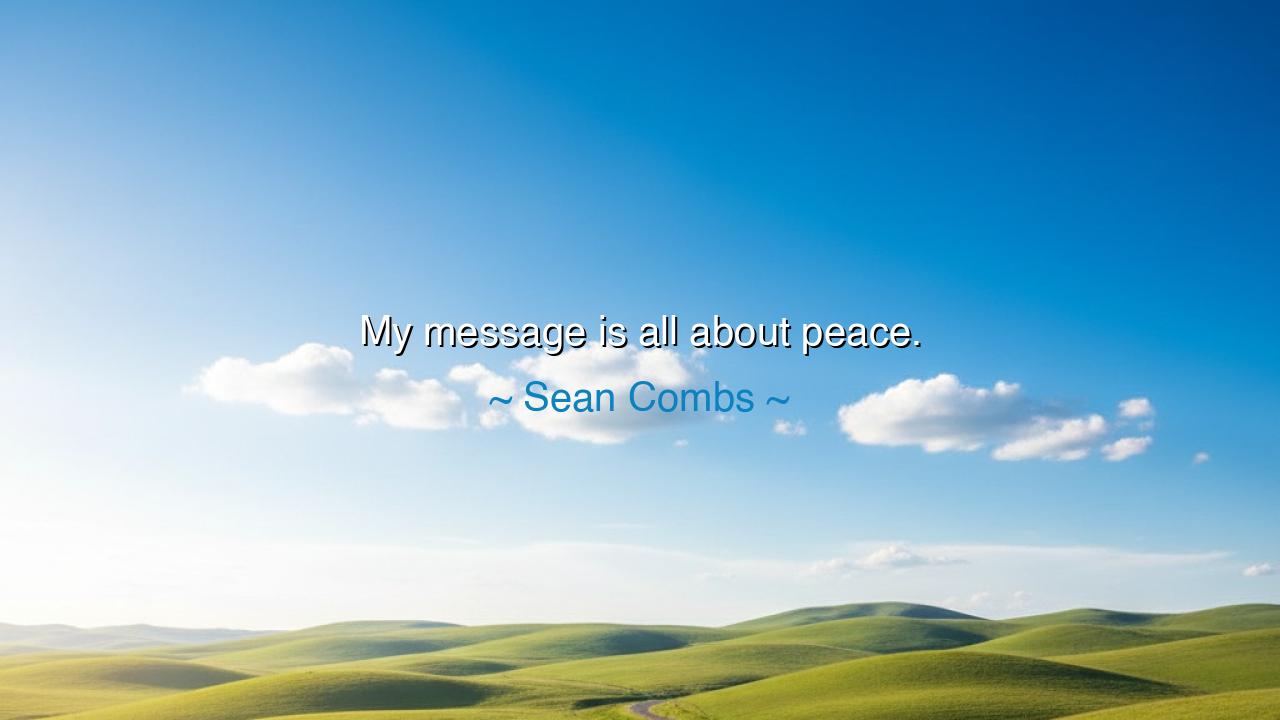
My message is all about peace.






Hear, O children of time, the simple yet eternal words of Sean Combs, who declared: “My message is all about peace.” At first glance, these words may seem like a whisper, a short breath upon the wind. Yet within their simplicity lies a truth as ancient as the mountains: that the highest purpose of art, of power, of voice, is not destruction, nor pride, nor conquest, but peace. To proclaim peace is to rise above the noise of rivalry and anger, and to set one’s heart upon harmony, healing, and the upliftment of all.
For what is peace but the crown of human striving? Wealth fades, fame flickers, power decays, yet peace endures as the highest treasure of the soul. When Sean Combs, a man of music and culture, speaks these words, he calls forth the responsibility of those who command influence. He knows that words, rhythms, and songs can sow discord, but they can also bind wounds, inspire love, and unite divided hearts. Thus, his declaration is not only personal, but universal: a reminder that every message we send into the world has power, and that power should serve peace.
History bears witness to this truth. Consider the voice of Bob Marley, who raised his songs in a world fractured by violence and oppression. With words of peace and unity, he inspired nations and peoples far beyond his own homeland of Jamaica. His concerts became more than gatherings of music—they became sanctuaries where enemies embraced, where bullets were silenced by rhythm. His message, like that of Combs, was simple: that no achievement, no glory, no art is greater than the building of peace.
But let us also recall the tragedy when peace is neglected. Look to times when artists and leaders have allowed their message to be poisoned by hatred or vengeance. The crowd, stirred not to harmony but to rage, has burned cities, toppled nations, and left scars upon history. From this we learn: the message matters, and the soul of the messenger shapes the destiny of the people. If the message is rooted in peace, the people will find healing. If it is rooted in violence, the people will inherit ruin.
O seekers of wisdom, learn this lesson: you too carry a message, though you may not hold a stage or a crown. Your words to your family, your friends, your community—these are your message. What will you sow? Will your words divide, or will they build? Will they echo with envy, or will they shine with peace? For peace is not only the work of kings and musicians; it is the work of every soul that draws breath.
Practical action lies close at hand. Begin with your speech: let your tongue be slow to anger and swift to kindness. In conflict, choose reconciliation over revenge. In your home, let your presence bring calm, not strife. In your work, let cooperation outweigh competition. And when you are tempted to sow bitterness, remember Sean Combs’ words: “My message is all about peace.” Let that be your compass, your anchor, your guide.
Therefore, carry this teaching with courage: that the simplest message is often the most powerful. To live for peace, to speak for peace, to create for peace—this is not weakness, but strength beyond measure. For the warrior who conquers himself, the artist who uplifts the weary, the neighbor who forgives—these are the true builders of eternity. And when your days are done, may it be said of you also: your message, above all, was peace.






AAdministratorAdministrator
Welcome, honored guests. Please leave a comment, we will respond soon